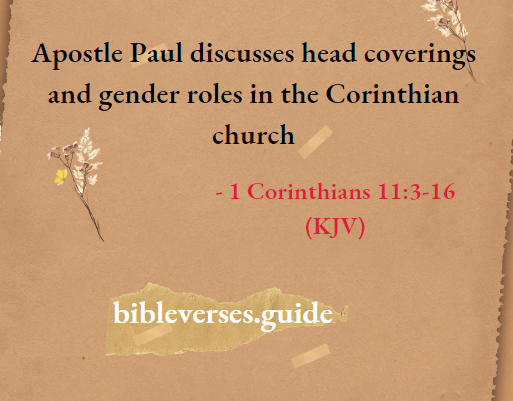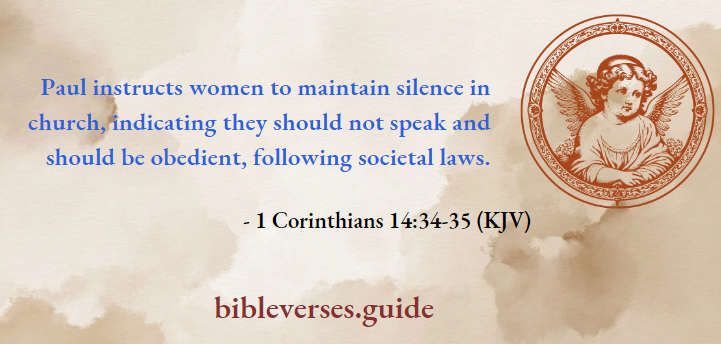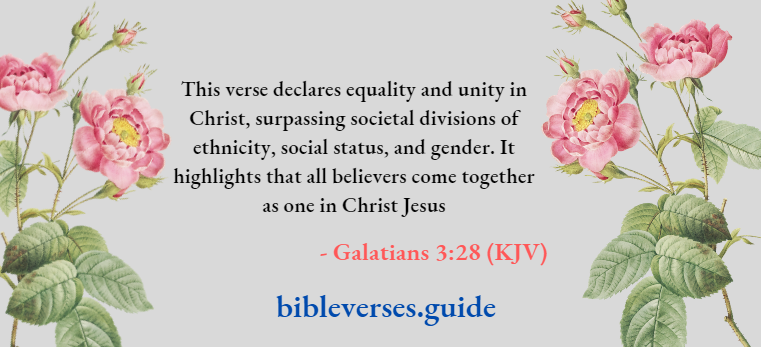“3 But I would have you know, that the head of every man is Christ; the head of the woman is the man, and the head of Christ is God.
4 Every man praying or prophesying, having his head covered, dishonoureth his head.
5 But every woman that prayeth or prophesieth with her head uncovered dishonoureth her head: for that is even all one as if she were shaven.
6 For if the woman be not covered, let her also be shorn: but if it be a shame for a woman to be shorn or shaven, let her be covered.
1 Corinthians 11:3-16 KJV
7 For a man indeed ought not to cover his head, for as much as he is the image and glory of God: but the woman is the glory of the man.
8 For the man is not of the woman; but the woman of the man.
Read and Learn More Empowering Bible Verses For Women
9 Neither was the man created for the woman, but the woman for the man.
10 For this cause ought the woman to have power on her head because of the angels.
11 Nevertheless, neither is the man without the woman, neither the woman without the man, in the Lord.
12 For as the woman is of the man, even so, is the man also by the woman; but all things of God.
Head coverings in 1 Corinthians 11 KJV
13 Judge in yourselves: is it comely that a woman prays unto God uncovered?
14 Doth not even nature itself teach you, that, if a man has long hair, it is a shame unto him?
15 But if a woman has long hair, it is a glory to her: for her hair is given her for a covering.
16 But if any man seems to be contentious, we have no such custom, neither the churches of God.”
1 Corinthians 11:3-16 (KJV)

Hierarchy Of Authority: Paul establishes a hierarchy with Christ over man, man over woman, and God over Christ, reflecting divine order.
The Symbolism Of Head Coverings: Men shouldn’t cover their heads as they represent God’s image, while women should cover theirs as they represent man’s glory.
Reasons For Head Coverings: Paul emphasizes submission, respect, and the created order of man and woman, also mentioning reverence in the presence of angels.
Mutual Dependence: Despite roles, Paul stresses the mutual importance of men and women in God’s plan.
Nature And Customs: Paul uses nature and cultural norms to support his argument on gender distinctions.
Freedom And Flexibility: Paul allows for differing practices on head coverings, promoting independence and flexibility in non-essential matters.
Overall, 1 Corinthians 11:3-16 addresses head coverings and gender roles in worship, highlighting respect, submission, and cultural diversity while affirming mutual dependence between men and women.
Points To Ponder:
Shared Spiritual Authority: Paul establishes a hierarchy of authority, acknowledging that Christ is the head of every man and man is the head of woman. This highlights that women, too, have a direct connection with Christ. Understanding this empowers us as women, as our spiritual authority and relationship with God are personal and direct.
Respect For Women’s Contributions: Paul stresses the importance of women’s involvement in prayer and prophecy while discussing head coverings. Recognizing women’s spiritual gifts and contributions encourages us to actively participate in worship and ministry, knowing that our voices and insights are valued and respected in the church.
Equality In Mutual Dependence: Despite outlining hierarchical roles, Paul emphasizes the mutual dependence and interconnectedness between men and women in the Lord. This underscores that both genders are vital in God’s plan, emphasizing that neither can function without the other.
This mutual dependence empowers women to embrace their role as equal partners in furthering God’s kingdom.
Bible Verses About Head Coverings KJV
Freedom In Cultural Context: Paul acknowledges the cultural backdrop of head coverings and allows for flexibility within certain customs. This acknowledgment of cultural diversity and freedom enables women to worship and ministry within their cultural contexts without feeling constrained by strict traditions.
Honoring Women’s Glory: Paul recognizes the glory of womanhood, acknowledging that women are the glory of man. This affirmation of women’s inherent value empowers us to embrace our identity as cherished daughters of God, created in His image with dignity and significance.
In summary, 1 Corinthians 11:3-16 affirms our spiritual authority, acknowledging our contributions to the church, highlighting equality and mutual dependence with men, allowing for cultural diversity and freedom, and honoring the glory of womanhood.
Embracing these truths empowers us to actively engage in worship, ministry, and leadership within the church, knowing that our voices, gifts, and experiences are essential to the body of Christ.
“34 Let your women keep silence in the churches: for it is not permitted unto them to speak; but they are commanded to be under obedience as also saith the law.
35 And if they will learn anything, let them ask their husbands at home: for it is a shame for women to speak in the church.”
1 Corinthians 14:34-35 (KJV)
Interpreting 1 Corinthians 14:34-35 involves Paul’s guidance to the Corinthian church on women’s behavior during church gatherings.

To understand these verses fully, one must analyze the cultural and historical background, aligning them with other scriptural passages.
Key Points to Consider:
Cultural Norms: In the first-century Greco-Roman era, women had restricted roles in public and religious settings, possibly influencing Paul’s directives. Church Etiquette: Paul stresses order and decorum in church assemblies, advising women to be submissive and quiet, reflecting the church’s authority structure.
Legal References: Mentioning obedience “as also saith the law” may refer to Jewish legal customs or Old Testament teachings on gender roles and submission.
Learning Guidance: Women are encouraged to seek knowledge from their husbands at home, aligning with traditional gender roles and male leadership in teaching.
Interpretation Challenges: These verses have sparked diverse interpretations and discussions within Christian circles, with varying views on their universal applicability.
Broader Context: Considering Paul’s teachings on gender and ministry in other passages, like affirming women’s roles in church, provides a more comprehensive understanding.
What Does 1 Corinthians 11:3-16 Mean KJV?
1 Corinthians 14:34-35 triggers interpretative dilemmas and prompts reflections on gender roles in church contexts. It’s crucial to approach these verses with an awareness of cultural context, theological principles, and the broader scriptural teachings.
Points to Ponder:
Contextual Understanding: Women approaching this passage can collectively acknowledge the cultural norms of the first-century Greco-Roman world, which often restricted women’s roles in public settings.
Understanding this context helps recognize the progress made over centuries toward gender equality and inclusion within Christian communities.
Critical Analysis And Interpretation: Engaging in a critical examination and interpretation of the passage allows for recognizing its complexities and challenges. By exploring historical and linguistic scholarship and considering diverse interpretations, a deeper understanding of the text can be achieved.
Seeking Wisdom and Discernment: Seeking wisdom and discernment from God’s Word and the Holy Spirit while grappling with difficult passages is essential. Through prayer, study, and reflection, insights can be gained on applying biblical principles of love, justice, and equality.
Affirming Dignity and Worth: Despite the limitations in the passage, affirming the inherent dignity, worth, and equality of women as beloved daughters of God is crucial. Recognizing one’s value in God’s eyes empowers us to speak up, share talents, and advocate for justice within the church and society.
Embracing Inclusive Community: Striving for an inclusive community where all members are valued and empowered regardless of gender, race, or social status is essential. Working together in solidarity creates environments where everyone’s gifts are acknowledged, nurtured, and celebrated.
Although 1 Corinthians 14:34-35 may pose challenges, engaging with the text and applying its principles to affirm dignity, equality, and inclusion can empower our communities.
“There is neither Jew nor Greek, there is neither bond nor free, there is neither male nor female: for ye are all one in Christ Jesus.”
Galatians 3:28 (KJV)

Let’s delve into its significance:
Equality. The verse asserts the equality of all believers before God, irrespective of ethnicity, social status, or gender. It emphasizes that God equally values and loves everyone, regardless of external differences.
Unity in Christ. By stating believers are “all one in Christ Jesus,” it underscores the unity among Christ’s followers. In Christ, there is no room for division based on worldly categories; instead, believers are united in their shared faith in Him.
Radical Inclusivity. This verse embodies the Gospel’s inclusivity, extending salvation and acceptance to all, regardless of background. It emphasizes that all are invited to partake in the Christian community, embracing God’s grace and mercy.
Social Justice Implications. Galatians 3:28 challenges discrimination and inequality, urging believers to advocate for justice and equality within and beyond the Christian community.
Identity in Christ. Ultimately, Galatians 3:28 reminds believers of their identity as followers of Christ, defined by their relationship with Him. It calls for living in ways that mirror Christ’s love, unity, and inclusivity.
Galatians 3:28 embodies the profound truth of equality and unity in Christ, encouraging believers to embrace a community marked by love, acceptance, and inclusivity.
Points to Ponder:
Shared Equality: The verse in Christ Jesus states that “there is neither male nor female.” This declaration assures women of their equal standing before God. Gender does not define or restrict us; instead, we are acknowledged as equal recipients of God’s grace and salvation alongside our male counterparts in Christ.
This acknowledgment of shared equality encourages us to confidently embrace our identity and value as cherished daughters of God.
Unity in Diversity: Galatians 3:28 confirms that in Christ, there is no distinction between Jew or Greek, slave or free. This statement encompasses all forms of diversity, including gender.
Women are integral members of a diverse and unified community of believers, where our differences are celebrated rather than used to divide us. This unity in diversity enables us to embrace our unique talents, gifts, and perspectives, knowing that we contribute to the richness and wholeness of the body of Christ.
Freedom from Limitations: By stating that there is no distinction between male and female in Christ, this verse liberates women from societal expectations and limitations based on gender.
We are no longer confined to conventional roles or marginalized by gender. Instead, we are free to actively engage in the church’s life and pursue God’s purpose for us, secure in our identity and worth as women made in the image of God.
Solidarity in Christ: Galatians 3:28 encourages us to stand in solidarity as sisters in Christ. Despite our diverse backgrounds and experiences, we are united by our shared faith in Jesus Christ.
Paul’s Teaching On Headship And Authority KJV
This solidarity empowers us to support, uplift, and motivate one another through life’s ups and downs. We are part of a supportive community where we can find strength and encouragement in our shared identity in Christ.
Advocacy for Justice: This verse urges us to advocate for justice and equality within the church and society. As women who uphold the equality of all believers in Christ, we are called to challenge oppressive systems and biases that perpetuate gender inequality.
We are empowered to speak up against injustice and strive to create environments where all women are esteemed, respected, and enabled to fulfill their God-given potential.
In summary, Galatians 3:28 affirms equality, embracing diversity, releasing us from limitations, inviting us into solidarity, and urging them to champion justice. By adopting these truths, we are empowered to live out our faith confidently and authentically, knowing they are treasured, esteemed, and enabled as beloved daughters of God.
